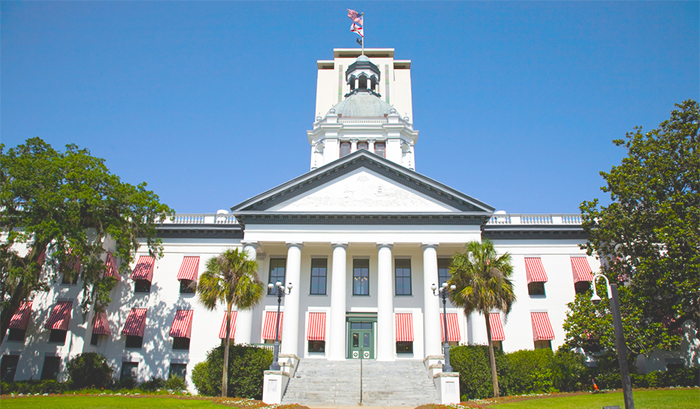Legislative Update: Legislative Session Summary – Solid Waste Authority of Palm Beach County

Senator Perry refiled legislation during the 2019 legislative session regarding environmental regulation (SB 816/HB 771). A similar version was vetoed by Governor Scott last year. HB 771 requires local governments to address the contamination of recyclable material in contracts for the collection, transportation, and processing of residential material. The original 2019 version applied to contracts executed or renewed after July 1, 2019. We worked directly with Senator Perry to have that date changed to October 1, 2019, and expressed lingering concerns regarding the amended version. His office agreed to address any unintended consequences during the upcoming session. The bill was vetoed by Governor DeSantis on May 10, 2019.
Below you will find a detailed list of others bills that passed and failed during the 2019 Legislative Session. Bills that failed will be revisited sooner than the previous year. The 2020 Legislative Session will begin in less than eight months due to the constitutional change for election years.
BILLS THAT PASSED
HB 5401 – Department of Environmental Protection, transfers specified powers and duties of the FWCC relating to environmental crimes to the Division of Law Enforcement within the DEP. The bill also provides for the DEP and the FWCC memorandum of agreement, and provides for the reassignment of personnel and the retention of benefits. It also establishes the Division of Law Enforcement within the DEP, and provides specified authority to the DEP and the FWCC officers. Furthermore, it provides for the deposit of proceeds in specified DEP trust funds, and appoints a DEP representative to the Joint Task Force on State Agency Law Enforcement Communications. Finally, the bill authorizes certain use of Inland Protection Trust Fund moneys, and provides penalties for false personation and unlawful use of badges and other symbols of DEP officers.
BILLS THAT FAILED
SB 164 (HB 89) – Verification of Employment Eligibility, requires employers to register with and use E-Verify systems to verify employment eligibility of new employees.
SB 518 (HB 265) – Public Meetings, revises public meeting notice requirements, and provides that members of the public have right to speak at public meetings. The bill also required members of boards or commissions to respond to all questions asked at public meetings.
SB 694 – Disposable Plastic Bags, authorizes certain municipalities to establish a pilot programs to regulate or ban disposable plastic bags, and also provides for the adoption and expiration of a certain required ordinance.
HB 405 (SB 1278) Biosolids Management, prohibits land application of biosolids on certain sites, and revised rules for biosolid management.
SB 1568 – Discharge of Domestic Wastewater, prohibits the construction of new deep injection wells for domestic wastewater discharge or the expansion of existing wells, and also limits the discharge capacity of domestic wastewater deep well injection. The bill also prohibits the discharge of domestic wastewater through ocean outfalls and deep injection wells after specified dates.
SB 672 (HB 853) – Beverage Container Deposits, established a refund value for specified beverage containers, and required dealers and consumers to pay a deposit fee for beverage containers. It also mandated redemption centers to be registered with the Department of Environmental Protection.
SB 1762 (HB 1291) – State Renewable Energy Goals, directs the Office of Energy within the Department of Agriculture and Consumer Services, in consultation with other state agencies, state colleges and universities, public utilities, and other private and public entities, to develop a unified statewide plan to generate the state’s energy from renewable sources by specified dates.
SB 1758 (HB 141) – Water Quality Improvements, cites this act as the “Clean Waterways Act”, and requires the Department of Environmental Protection, in coordination with the Department of Health, to develop a report to be submitted to the Legislature by a specified date on the impacts of transferring the onsite sewage program of the Department of Health to the Department of Environmental Protection by a type two transfer. The bill also revises the requirements for a basin management action plan for an Outstanding Florida Spring, and establishes a wastewater grant program within the Department of Environmental Protection.
SB 1572 (HB 1237) – Displacement of Private Waste Companies, revises the process for a local government to displace a private waste company in a county or municipality, and requires a local government to announce its intent to adopt an ordinance or a resolution for organized collection service through a resolution of intent. It also provides requirements for the resolution of intent.
SB 1022 (HB 973) – Onsite Treatment and Disposal Systems, transfers the Onsite Sewage Program within the Department of Health to the Department of Environmental Protection, and removes provisions prohibiting the award of research projects to certain entities. The bill also requires the county health departments to coordinate with the department to administer onsite sewage treatment and disposal system evaluation programs, and requires the Department of Environmental Protection to appoint an onsite sewage treatment and disposal systems technical advisory committee.
SB 1716 (HB 157) – Fertilizers, requires county and municipal governments to adopt and enforce Model Ordinance for Florida-Friendly Fertilizer Use on Urban Landscapes. The bill also provides that local governments must require the use of slow-release fertilizers.





